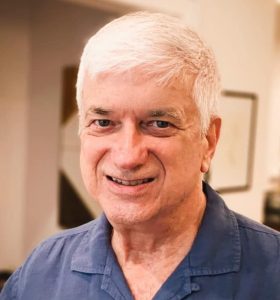by Bill Considine
The Star-Spangled Banner
Michael Ruby
Station Hill Press
In this time of sharp political division in America, the rituals attendant to the national anthem have stirred polarization. The controversy in recent years over athletes kneeling during the anthem to protest racial injustice highlights how very often the anthem plays. In the poem, “Memories of the Star-Spangled Banner,” Michael Ruby recalls many such moments, at Yankee Stadium, in school assemblies, before the Super Bowl, and at a college reunion. He recalls the preliminary announcements to “please rise … for our national anthem” and his own quiet protests by remaining seated for the anthem starting in 2003, after “our fraudulent invasion bursting of Iraq.” He sat through elementary school graduations, then middle school, then high school graduations as that “war of occupation” went on and on.
The lyrics of the anthem serve as an organizing principle to convey the complexity of our political life, in Michael Ruby’s new book, The Star-Spangled Banner. The anthem has long interested him. His chapbook of the same name appeared in 2011, and individual poems on the anthem appear in his books Compulsive Words and American Songbook. Those two book titles themselves express this new book’s intertwined helix of themes, as traditional song and new language express our political consciousness.
His method is to insert words and phrases between the words of the anthem’s lyrics, sometimes in a continuing narrative, sometimes more focused on the beauty within words or patterns of words.
The anthem permeates each poem just as political concerns pervade our daily living. The anthem continues to its robust finale, whatever poetry may be added to it. It is a sturdy structure. With new words interspersed within the anthem’s lyrics, syntax and meaning are disrupted, but a reader can see a narrative or other patterning in what the poet has added. The halting quality of the mixed discourses—the lyrics and the added poetry continually interrupting each other—suggests a hesitancy that the poet overcomes to offer what must be said in the poem.
The first few lines of the poem “The Star-Spangled Banner” serve to illustrate the method in a poem of outrage:
O The Star-Spangled Banner say so misused can like the flag you we
smashed up Iraq see killed a lot of people
By for no known reason the we inflamed a whole region dawn’s we inflamed
a whole region early so misused light we smashed up Iraq
The poetry is wide-ranging. One of the many pleasures of this book is the variety of concerns and observations. There is humor in the poems’ imaginative reach and flair for formal variation. “O zero” needs only two words, repeated again and again, to convey the lines of binary code that underlie electronic communication.
There are evocative poems of daily life and community, including “Repeated Memories” and “People in Dreams” and a Fourth of July complete with fireworks and fireflies in “From a Red 2003 Standard Diary.” Poems taken from diaries give us mornings of family and voting at a public school and evenings of hard, pressured work with colleagues, preparing political news stories for immediate publication. The delicious details of “A Few of My Favorite Things” are a feast of language, and the concept expands later into poems on favorite things in T.S. Eliot, in Allen Ginsberg, and in American poetry through the 1970s. The jazz musician Ornette Coleman is addressed in two poems as well.
Many of the poems are titled beginning with “O” as in an old ode, and as the anthem itself, an ode to the flag still waving as a sign of victory, begins. A particularly beautiful ode, conveying the poet’s love of the great city, is “On the Subway Ride to Work.” That quotidian journey into the workday is exalted by glimpses of two world-famous symbols along the way—Wall Street and the Statue of Liberty—as the poet repeats in apparent wonder and delight.
The first poem, “From a Red 2001 Standard Diary,” is a remarkable portrait of family concerns and conversations as the 9/11 attack on New York unfolds. Other poems cover presidential elections, from “The Triumph of the Red States in 2004,” an interspersed list poem of the names of all the states, with the red states repeated to prevail by sheer numbers, through a poem near the end that quotes the rambling, crass boasting and insults from “Donald Trump at the Republican Debate on August 6, 2015.” Then the next-to-last poem in the book, “Voices at the End of Election Night on November 9, 2016,” expresses a hubbub of surprise and calamity.
Along the way, the 2012 campaign is particularly fraught, with “O the fear” conveying the fright that Obama might not be re-elected, through repeated insertion of the words “the fear” between each word of the anthem’s lyrics to quite fearful effect. The next poem is “O relief” and rejoices again and again over “Romney’s Benghazi Blunder,” a humorous relief indeed.
The focus on politics extends beyond elections. The poems “U.S. News Headlines in 2010” and “U. S. News Headlines in 2014” convey the continuous, ephemeral chatter of issues and public figures. The amusing “House Republican Leaders Violating the Ten Commandments” begins and ends with the notorious Dennis Hastert and Tom Delay and includes numerous other politicians, each assigned a forbidden sin. “America’s Overseas Military Bases” is a list poem of far-flung strongholds interspersed within the anthem’s lyrics, from Camp Fallujah through Guantanamo Bay Naval Station.
The language is always intriguing and often challenging. A love of words is evident, sometimes luxuriating in their richness and plenitude and sometimes testing new explorations into the unknown. The language of the anthem compels attention too. The rocket’s red glare, the bombs bursting in air can seem overpowering as they disrupt the poet’s discourse or sometimes further impel its drive. In “O America,” we find “randazzle ramparts” and “bombs forever bursting.” In “O hope,” the poet brings in “bombards” and “fustian,” and describes “bombs electric bursting dee-dum in monumental air” in “the impulse land mirage of destiny.”
After the poem about Election Night 2016, there is one final poem, ”O failure.” It laments the failures “national,” “generational,” and “personal” that have contributed to our plight. What a price we have paid in the past four years for that night’s catastrophe and paid over two decades for the failures associated with 9/11 and invading Iraq.
But the final stanza of the anthem continues to call to the free and the brave, as resoundingly as the rockets and bombs burst forth in its previous stanza.
O failure say personal does his that generational star her spangled national
banner your yet his wave generational
O’er personal the their land my of our the our free personal
and my the your home her of his the generational brave failure
Michael Ruby has boldly expressed the centrality of politics, of news, and reacting to political news, in our daily life, and released the rage at our failures in politics and governance. Within a demanding, powerful structure, he has made poetry that is free to confront our political life as shaped in recent decades of dismay. It is a painful but necessary release and a great pleasure to read and ponder.
 BILL CONSIDINE (www.williamconsidine.com) writes poems and plays. His books include The Furies and Strange Coherence (both from The Operating System) and The Other Myrtle (Finishing Line Press). His full-length plays performed in 2019 include Moral Support at Medicine Show Theatre and Women’s Mysteries at Polaris North. His verse plays seen in 2020 include Aunt Peg and the Comptometer at The Bowery Poetry Club and Persephone’s Return and Odyssey’s End on Zoom from Polaris North. He is the printed matter editor and poets theater curator for Boog City, and a member of the Dramatists Guild, the theater arts cooperative Polaris North, and Brevitas, a poets’ cooperative. Careen Shannon photo.
BILL CONSIDINE (www.williamconsidine.com) writes poems and plays. His books include The Furies and Strange Coherence (both from The Operating System) and The Other Myrtle (Finishing Line Press). His full-length plays performed in 2019 include Moral Support at Medicine Show Theatre and Women’s Mysteries at Polaris North. His verse plays seen in 2020 include Aunt Peg and the Comptometer at The Bowery Poetry Club and Persephone’s Return and Odyssey’s End on Zoom from Polaris North. He is the printed matter editor and poets theater curator for Boog City, and a member of the Dramatists Guild, the theater arts cooperative Polaris North, and Brevitas, a poets’ cooperative. Careen Shannon photo.
 MICHAEL RUBY is the author of seven full-length poetry collections, including At an Intersection (Alef Books); Window on the City, The Edge of the Underworld, Compulsive Words, and The Mouth of the Bay (all from BlazeVOX [books]); and American Songbook (Ugly Duckling Presse). His trilogy in prose and poetry, Memories, Dreams and Inner Voices (Station Hill Press), includes ebooks Fleeting Memories (UDP) and Inner Voices Heard Before Sleep (Argotist Online). He is also the author of ebooks Close Your Eyes (Argotist) and Titles & First Lines (Mudlark), and five Dusie Kollektiv chapbooks. He co-edited Bernadette Mayer’s early books, Eating the Colors of a Lineup of Words (Station Hill), and Mayer’s and Lewis Warsh’s collaboration Piece of Cake (Station Hill) (see wordpress.boogcity.com/2021/03/26/lewis-warsh-michael-ruby/). He lives in Brooklyn and works as an editor at The Wall Street Journal. Michael Strozier photo.
MICHAEL RUBY is the author of seven full-length poetry collections, including At an Intersection (Alef Books); Window on the City, The Edge of the Underworld, Compulsive Words, and The Mouth of the Bay (all from BlazeVOX [books]); and American Songbook (Ugly Duckling Presse). His trilogy in prose and poetry, Memories, Dreams and Inner Voices (Station Hill Press), includes ebooks Fleeting Memories (UDP) and Inner Voices Heard Before Sleep (Argotist Online). He is also the author of ebooks Close Your Eyes (Argotist) and Titles & First Lines (Mudlark), and five Dusie Kollektiv chapbooks. He co-edited Bernadette Mayer’s early books, Eating the Colors of a Lineup of Words (Station Hill), and Mayer’s and Lewis Warsh’s collaboration Piece of Cake (Station Hill) (see wordpress.boogcity.com/2021/03/26/lewis-warsh-michael-ruby/). He lives in Brooklyn and works as an editor at The Wall Street Journal. Michael Strozier photo.

